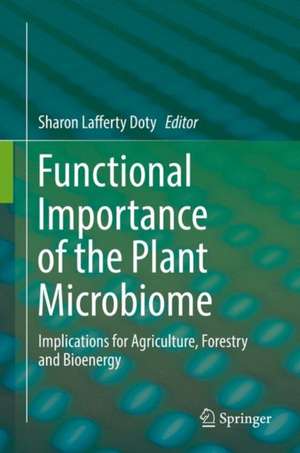Functional Importance of the Plant Microbiome: Implications for Agriculture, Forestry and Bioenergy
Editat de Sharon Lafferty Dotyen Limba Engleză Hardback – 5 oct 2017
Just as research on the mammalian microbiome has demonstrated its importance for overall health of the host, the plant microbiota is essential for plant health in natural environments. Endophytes, the microorganisms living fully within plants, can provide a multitude of benefits to the host including N-fixation, P solubilization, increased photosynthetic efficiency and water use efficiency, stress tolerance, pathogen resistance, and overall increased growth and health. A variety of culturable endophytes have been isolated and shown to be mutualistic symbionts with a broad range of plant species. These studies point to the functional importance of the microbiota of plants and suggest the potential for tailoring plant microbiota for improved vigor and yields with reduced inputs. This review covers the major benefits of microbial endophytes to plants and discusses the implications of using symbiosis as an alternative to chemical inputs for agriculture, forestry, and bioenergy.
| Toate formatele și edițiile | Preț | Express |
|---|---|---|
| Paperback (1) | 881.71 lei 6-8 săpt. | |
| Springer International Publishing – 12 iun 2018 | 881.71 lei 6-8 săpt. | |
| Hardback (1) | 887.68 lei 6-8 săpt. | |
| Springer International Publishing – 5 oct 2017 | 887.68 lei 6-8 săpt. |
Preț: 887.68 lei
Preț vechi: 1082.54 lei
-18% Nou
Puncte Express: 1332
Preț estimativ în valută:
169.88€ • 184.46$ • 142.70£
169.88€ • 184.46$ • 142.70£
Carte tipărită la comandă
Livrare economică 23 aprilie-07 mai
Preluare comenzi: 021 569.72.76
Specificații
ISBN-13: 9783319658964
ISBN-10: 3319658964
Pagini: 111
Ilustrații: V, 111 p. 19 illus., 12 illus. in color.
Dimensiuni: 155 x 235 mm
Greutate: 0.35 kg
Ediția:1st ed. 2017
Editura: Springer International Publishing
Colecția Springer
Locul publicării:Cham, Switzerland
ISBN-10: 3319658964
Pagini: 111
Ilustrații: V, 111 p. 19 illus., 12 illus. in color.
Dimensiuni: 155 x 235 mm
Greutate: 0.35 kg
Ediția:1st ed. 2017
Editura: Springer International Publishing
Colecția Springer
Locul publicării:Cham, Switzerland
Cuprins
Functional Importance of the Plant Endophytic Microbiome: Implications for Agriculture, Forestry and Bioenergy.- Endophytic Nitrogen Fixation: Controversy and a Path Forward.- Endophyte-Promoted Nutrient Acquisition: Phosphorous and Iron.- Endophyte Effects on Photosynthesis and Water Use of Plant Hosts: A Meta-Analysis.- The Symbiogenic Tango: Achieving Climate-Resilient Crops via Mutualistic Plant-Fungal Relationships.- Endophytic Phytohormones and Their Role in Plant Growth Promotion.
Notă biografică
Dr. Sharon Lafferty Doty is a Professor at the University of Washington, School of Environmental and Forest Sciences. Her research area is on the functional importance of the plant microbiome, specifically the microbial endophytes of poplar and willow, two early successional pioneer plant genera. She is the current Chair of the working group on Environmental and Ecosystem Services of the International Poplar Commission, a branch of the United Nations (UN). She was recently elected vice president of the International Symbiosis Society (ISS) in charge of education. She is also a member of the UW Astrobiology program. Her lab is currently working with microbial strains for improved phytoremediation of organic and inorganic pollutants, and for improved plant growth, health, and stress tolerance with reduced chemical inputs.
Textul de pe ultima copertă
This book addresses all the major mechanisms by which endophytes are thought to impact plant growth and health. A unique aspect of this publication is that it is multidisciplinary, covering plant microbiology, plant physiology, fungal and bacterial endophytes, plant biochemistry, and genomics.
Just as research on the mammalian microbiome has demonstrated its importance for overall health of the host, the plant microbiota is essential for plant health in natural environments. Endophytes, the microorganisms living fully within plants, can provide a multitude of benefits to the host including N-fixation, P solubilization, increased photosynthetic efficiency and water use efficiency, stress tolerance, pathogen resistance, and overall increased growth and health. A variety of culturable endophytes have been isolated and shown to be mutualistic symbionts with a broad range of plant species. These studies point to the functional importance of the microbiota of plants and suggest th
e potential for tailoring plant microbiota for improved vigor and yields with reduced inputs. This review covers the major benefits of microbial endophytes to plants and discusses the implications of using symbiosis as an alternative to chemical inputs for agriculture, forestry, and bioenergy.
Just as research on the mammalian microbiome has demonstrated its importance for overall health of the host, the plant microbiota is essential for plant health in natural environments. Endophytes, the microorganisms living fully within plants, can provide a multitude of benefits to the host including N-fixation, P solubilization, increased photosynthetic efficiency and water use efficiency, stress tolerance, pathogen resistance, and overall increased growth and health. A variety of culturable endophytes have been isolated and shown to be mutualistic symbionts with a broad range of plant species. These studies point to the functional importance of the microbiota of plants and suggest th
e potential for tailoring plant microbiota for improved vigor and yields with reduced inputs. This review covers the major benefits of microbial endophytes to plants and discusses the implications of using symbiosis as an alternative to chemical inputs for agriculture, forestry, and bioenergy.
Caracteristici
World-renowned scientists share their areas of expertise on plant microbiome research Fully up-to-date chapters on the symbiotic relationship between endophytes and host organisms Agricultural paradigms of using endophytes to improve plant health and crop yields are discussed
